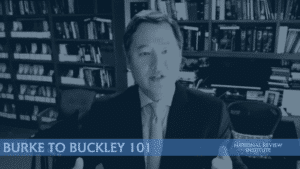
National Review Institute offers this six-week virtual Burke to Buckley course so that our members anywhere can experience firsthand the program’s informative and engaging sessions led by world-class scholars and public intellectuals. Readings include selections from The Federalist Papers, Milton Friedman’s Capitalism and Freedom, and Edmund Burke’s Reflections on the Revolution in France. The syllabus for this program can be found here.
Participants will meet via Zoom for a series of six weeknight seminars and are expected to attend all six sessions as well as complete a 25- to 30-page reading assignment per session, which they will discuss with a leading conservative thinker. Sessions involve spirited conversations around each topic. Discussion leaders are all experts in their fields and consist of popular writers/speakers at National Review, faculty at universities, and leading thinkers at policy groups.
The fee for the course is $200. For an additional $50 contribution (added at checkout), you will receive the benefits of our $250+ general membership, including invitations to our book club and other exclusive virtual and in-person events. 1955 Society Members at our Sustainer level or higher ($5,000+) receive complimentary invitations. Please contact us at info@nrinstitute.org with any questions.

Burke to Buckley 101 Syllabus
William F. Buckley Jr. & American Conservatism
For almost sixty years, William F. Buckley Jr. was the voice of a conservatism that managed to be both sober and combative, committed to permanent verities, and dismissive of a corrupt liberal orthodoxy. He brought style and intellectual penetration to conservatism as it emerged as a coherent movement after World War II. National Review, founded by Buckley and a cohort of friends in 1955, was—and remains—the flagship journal of a thoughtful American conservatism. This first session is dedicated to the thought and journalism of WFB and his role in shaping modern American conservatism.
Readings: Six WFB columns from the anthology Athwart History, Lee Edwards’ “What is Conservatism?,” Russell Kirk’s The Conservative Mind, Friedrich Hayek’s Political Economy.
Burke, Prudence & the Spirit of Conservatism
The great eighteenth-century Anglo-Irish statesman and political philosopher Edmund Burke was in important respects the father of modern conservatism. A champion of the American cause and a panegyrist to English liberty, he saw the great evils at work in the French Revolution and in modern ideology more generally. An evocative writer and rhetorician, he defended reform, not revolution, and what can be called a “politics of prudence.” He was the enemy par excellence of abstraction in politics, of an appeal to abstract ideas that ignores circumstances, the wisdom of the ages, and settled tradition.
Readings: Selections from Edmund Burke’s Reflections on the Revolution in France, Yuval Levin’s The Great Debate, and Friedrich Hayek’s Political Economy.
The Founders’ Constitution
The United States is that rare country whose nationhood is coextensive with her constitutional arrangements. The “philosophy” of the American Constitution is laid out with remarkable learning, penetration, and insight in the Federalist Papers (1787–1788), written by Madison, Hamilton, and Jay. Any thoughtful American conservatism will aim to “conserve” the constitutional heritage bequeathed by our constitutional Founders.
Readings: Federalist #10, 51, and 84; Charles Kesler’s Introduction to the Signet Classic edition of The Federalist Papers; and Richard Brookhiser’s Founding Father: Rediscovering George Washington, his James Madison, and his Alexander Hamilton, American.
Economic Freedom & Political Freedom
“Economic arrangements play a dual role in the promotion of a free society. On the one hand, freedom in economic arrangements is itself a component of freedom broadly understood, so economic freedom is an end in itself. In the second place, economic freedom is also an indispensable means toward the achievement of political freedom” (Milton Friedman, Capitalism and Freedom).
Readings: Selections from The Essence of Hayek and Milton Friedman’s Capitalism and Freedom.
Conservatism, Democracy & Foreign Policy
Americans have grown war-weary and tired of military engagements abroad. Yet America has vital interests and an abiding commitment to the survival of western civilization. The readings in this session explore the necessity for American foreign policy to combine spiritedness and moderation and to avoid the twin pitfalls of democratic crusadism and escape from our responsibilities in the world.
Readings: Selections from John Fonte’s Sovereignty or Submission, Henry Nau’s Conservative Internationalism, and Nathan Tarcov’s Principle and Prudence in Foreign Policy
Mediating Structures between the State & the Individual
The best conservative thought opposes radical individualism (which erodes the “mediating structures” between the state and the individual) in the name of those associations and groupings that give shape and form to human liberty. Alexis de Tocqueville famously praised Americans for their prodigious “art of association,” their remarkable capacity to form voluntary associations between the state and the individual. Contemporary conservative thinkers such as Robert Nisbet, Richard John Neuhaus, and Peter Berger have drawn on Tocqueville’s wisdom to show how “mediating structures” can renew community and “empower people,” and in the process act as a check on state power.
Readings: “To Empower People: The Role of Mediating Structures in Public Policy” by Peter L. Berger and Richard John Neuhaus and “On the Use that Americans Make of Association in Civil Life” by Alexis de Tocqueville.
